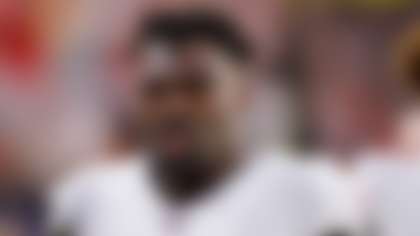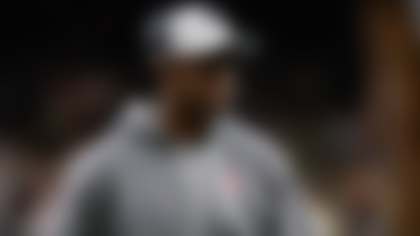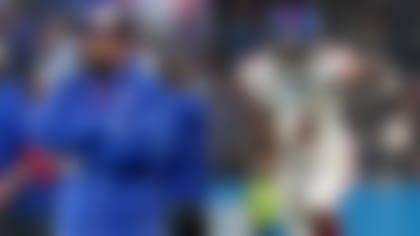I love the NBA trade machine that some basketball specific Web sites offer to their fans. It's so much fun to waste time making trades for your favorite team realizing that no one is listening, or no one even cares about your ideas. I have made more than 100 trades for the 76ers. Although they have all fallen on deaf ears, it's still fun.
Trading is one of the best things about baseball and basketball, yet in the NFL, teams are often reluctant to make trades.
One of the reasons former Packers general manager Ron Wolf retired was because trading became more difficult. Wolf, known in some circles as "Trader Ron," loved to deal, in part because he wasn't afraid to make or even admit a mistake.
Wolf loved "concept trades," meaning both players being traded fit a specific concept or theme. For example, he loved to trade a player who was entering the last year of restricted free agency to another team for a player in a similar contract situation.
Wolf knew his team was not going to sign the player to an extension, so why not trade him to another team in hopes of getting another player back that you might sign to an extension. This is exactly how Ahman Green became a Packer. Wolf traded cornerback Fred Vinson to the Seahawks for Green, which worked out very well for the Packers; while Green went on to become Green Bay's all-time leading rusher, the oft-injured Vinson never played another game in the NFL.
Nice concept.
Since no one is listening to my 76ers trade ideas, I thought I might make a few suggestions for NFL teams. Here are three trades that should happen, but likely won't:
1. San Diego trades defensive end/linebacker Shawne Merriman to Atlanta for inside linebacker Stephen Nicholas and a third-round pick in 2011. If Merriman re-signs with the Falcons, then the pick becomes a second-rounder.
Besides Merriman's appearance on the HBO show "Entourage," the Chargers have seen very little of him this offseason.
Merriman's career is at a crossroads, in spite of the cameo on TV. Almost everyone I talk with wants to know which player the league will see this year -- the dominant player who collected 39.5 sacks in his first three years, or the one that is recovering from injuries and has only four sacks to his name the last two seasons.
With Merriman there is always a little cloud around his play. Was his great first three years a result of steroids use (which he was suspended for), or rather just his raw talent? Even the Chargers don't know the answer to that question. They do know, however, they are not going to re-sign Merriman to an extension next year unless he returns to his 2006 form (when he had 17 sacks in just 12 games).
The Falcons would be a perfect team for Merriman to re-establish his career. Indoors, perfect field conditions, a loud crowd, and a great bookend rusher in John Abraham.
The Falcons need a dominant rusher (who doesn't?) and taking a chance on Merriman would be a smart move. They drafted Sean Weatherspoon in the first round and need to get him on the field, thus making Stephen Nicholas expendable.
The Chargers can assume they will get a compensatory pick (a third-rounder) from losing Merriman, if there is a new CBA and if -- a big "if" here -- the framework of the current system stays in place. Therefore to make the deal now, they would need to get a second-rounder and another asset. With the conditional second, the Chargers are still at no risk.
Merriman needs to realize that no one is going to give him a new deal unless he plays well this season. Yes, his statistics for the first three years are Entourage-cameo worthy, but there are some real issues that make any long-term investment very risky. The Falcons take a risk but are protected by just giving away a third-round pick and a player who was not going to be a starter.
2. Washington trades defensive tackle Albert Haynesworth to Houston for wide receiver Jacoby Jones and a fifth-round pick.
As of right now, I know now the Redskins and Big Albert are on the same page, but how long will this last?
This is not a marriage inspired by love, but rather from money. And money is no reason to stay together. Washington needs a vertical big-play receiver who knows the offense and can help in the return game.
He might not play hard all the time, but when he does, he is a force, and could be the missing link the Texans need on defense. Jones is an outstanding return man, and last year he showed flashes of being able to make a significant contribution on offense, scoring six touchdowns. He would fit into the Mike/Kyle Shanahan offense very well, giving the Redskins the speed vertically down the field they covet and, most importantly, need.
On the surface this trade does not favor the Redskins. How does it make sense to trade a top defensive lineman for a returner/receiver? But everyone in the league knows that Haynesworth's value is at an all-time low right now. If Haynesworth is not going to be a good teammate or play to his highest level, then Washington has to move him. There is no other alternative.
Being out of football at the time and with no connection to the Redskins, Mike Shanahan did not pay Haynesworth the astronomical money, making it much easier for the new coach to move him. The Redskins need more outside speed and a return man badly, so Jones can make an immediate impact for them.
3. Dallas trades its 2011 first-round pick and OT Doug Free to Tampa Bay for OT Donald Penn.
Let's face two facts:
1. The Bucs are not going to win the Super Bowl this year.
2. They do not seem willing to spend big money on signing or re-signing any players.
One of the Bucs best players, Penn plays a position of importance (left tackle) and coveted by all teams. Regardless, the Bucs do not seem serious about signing him to an extension. They would much rather have him play out his tender, which is odd given the huge money they invested in 2009 first-round quarterback Josh Freeman.
With an apparent youth movement happening on and off the field in Tampa (one of the reasons for the dismissal of former coach Jon Gruden), Penn, in theory, should be part of that movement. But because he will command huge money and maybe because current general manager Mark Dominik does not seem to have the power, persuasive ability, belief in Penn, or clout, it doesn't appear the Bucs will sign Penn to an extension.
Bucs owners might want to read a piece in the Wall Street Journal by Peggy Noonan, titled "Youth Has Outlived Its Usefulness."
I robustly understand that politics and football don't mix, but in this instance Noonan's argument applies. She makes a case that there is a need for some older, wiser ideas, and that some experience is necessary to blend with a youthful management team. There is no better case for this than in Tampa. Red the piece before you judge the comparison.
Do you think Gruden would have let Bucs management get away with what they have done the last year if he had still been the coach?
With Penn likely to be gone after this season, the Bucs need to maximize their assets now.
The Cowboys have an outstanding team -- a Super Bowl-caliber team -- with some slight concerns at left tackle. Penn would solve those problems by giving Dallas a blue-chipper at one of the game's most important positions. Penn could be the missing piece for the Cowboys to reach the Super Bowl in 2011. They can easily extend his contract by giving him a deal in line with D'Brickashaw Ferguson's recent extension with the Jets.
The Bucs would gain a first-round pick next year and would still have a potential solid starter to help them protect Freeman's blind side this season. They can sell this trade to their fan base by saying this was a concept deal. Trade a proven asset that was not going to re-sign to a proven contending team and invest in the future.
The Bucs save money, build for the future with a draft asset, and Dallas gets its missing piece. For the Cowboys, trading for Penn is a luxury they can afford.



